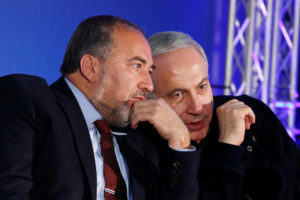by WorldTribune Staff, May 19, 2016
Israeli Prime Minister Benjamin Netanyahu solidified his power base on May 18 by replacing moderate pro-U.S. Defense Minister Moshe Ya’alon with nationalist pro-Russia former Foreign Minister Avigdor Lieberman.
The move came amid increasingly toxic relations between Netanyahu and U.S. President Barack Obama who is seen as likely to make another push for Israeli-Palestinian negotiations before leaving office in January 2017.

Justice Minister Ayelet Shaked of Jewish Home, said: “Avigdor Lieberman is part of the nationalist camp, and I think the coalition, together with him, with 67 legislators will hold together until 2019,” when Israel’s next election is due.
If Netanyahu remains in office until the end of July 2019, he will be Israel’s longest serving prime minister.
Lieberman, a settler in the West Bank, has questioned Palestinian President Mahmoud Abbas’s commitment to peace and the loyalty of Israel’s Arab minority, while pushing for stronger military action against Gaza’s Hamas terrorist organization.
“It’s already an extremist government and now it will get even more extreme. This government will block any horizon for peace,” said Wasel Abu Youssef, a member of the executive committee of the Palestine Liberation Organization.
An Egyptian official, who spoke on condition of anonymity, told Reuters: “We’re shocked, we’re really shocked.” He noted that the Lieberman appointment came just a day after a speech by Egyptian President Abdul Fatah Sisi pledged Cairo’s help to try to end the Israeli-Palestinian conflict.
The defense minister position has wide-ranging powers over the Israeli military but also for law enforcement in the West Bank. The defense minister also is heavily involved in deciding whether or not to give settlements permissions to expand.
“I hope Lieberman lives to 120, but I think that even if he does, he will not gain the prowess, knowledge and experience that Ya’alon has. These kind of chances should not be taken,” former Defense Minister Moshe Arens told Army Radio.
Ya’alon was criticized by ultranationalists and his own Likud party for backing the military’s decision to prosecute a soldier who shot dead a wounded Palestinian attacker in the West Bank in March.

You must be logged in to post a comment Login